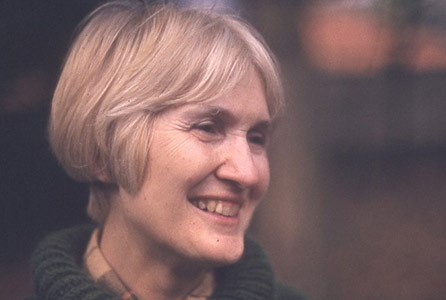
France
Adrienne Clostre was born in 1921 in Thomery (Seine-et-Marne). Her father – a chemical engineer and amateur singer – nurtured her taste for singing, while her mother introduced her to poetry. At age nine, after hearing Boris Godounov de Moussorgski, she decided to become a composer. She entered the Paris Conservatory in 1939, won a second prize for piano in Yves Nat’s class, studied further under Jean and Noël Gallon, Darius Milhaud, Jean Rivier, and Olivier Messiaen, and won the Grand Prix de Rome for composition in 1949. During her stay in Rome, she met her future husband, Robert Biset, who had won the Grand Prix de Rome for architecture. They married in 1951 and had two daughters together. Her surviving body of work includes several pieces of “absolute” music, such as Concerto pour hautbois (1969), Concerto pour violon et flûte (1972), Concerto pour trompette (1987), Six dialogues pour hautbois solo (1972), and Permutations pour hautbois, trompette, trombone et alto (1972-1978). Other works show her drawing inspiration from text: An adaptation of Baudelaire’s L’Albatros for female voice and percussion (1987); Garbo, la Solitaire (1995) for solo cello and spoken-word voice-over; and Sun for string quartet and Waves for piano (both 1991), inspired by Virginia Woolf. But she was most passionate about musical theatre, a reflection of the aesthetic clashes of her childhood. One of her first works was Julien l’Apostat, a dramatic opera on a libretto based on Ibsen, which her father began writing and which she completed. It was composed between 1962 and 1970, and loosely inspired by serialism. She also composed Nietzsche (1975), setting the philosopher’s writings to music; Cinq scènes de la vie italienne (1980), inspired by various human interest stories; Le Secret, ou une lecture musicale du journal de S. Kierkegaard (1982); Annapurna (1988) based on Maurice Herzog; and Le Triomphe de la vertu (1993) on her own libretto, based on the nun Hrotsvitha’s comedy Dulcitus.
– Florence Launay, based on the work of Pierrette Germain –
[Traduction en anglais : Raphaël Meyer]
– Florence Launay, based on the work of Pierrette Germain –
[Traduction en anglais : Raphaël Meyer]
List of Works
Contributor:
Présence Compositrices - last updated 16 December 2024